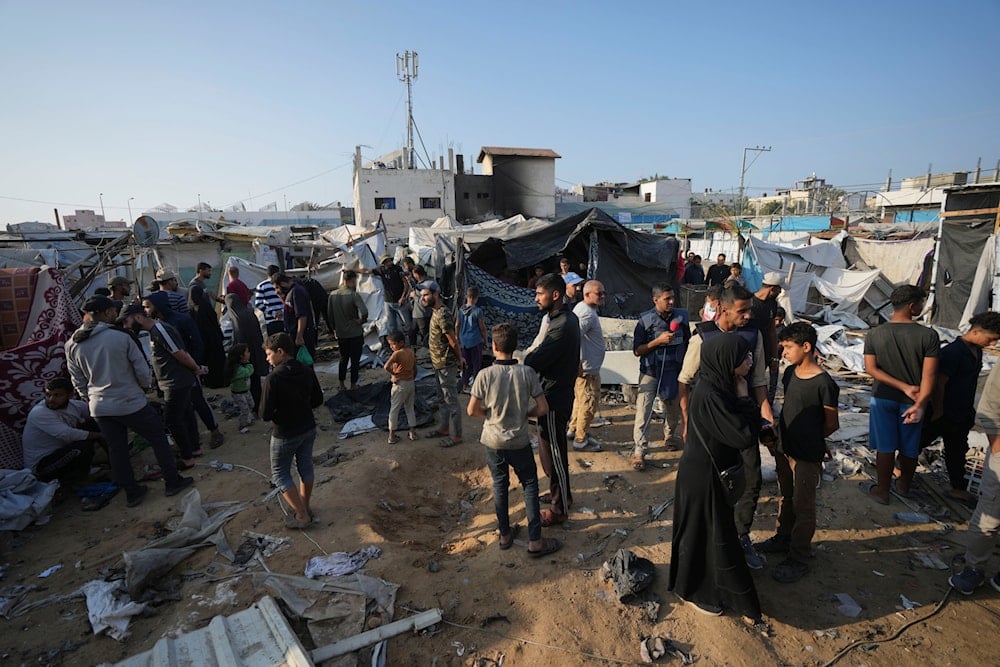'Israel' allowed aid, if any, 'is already too late': UNRWA official
Aid groups report that the Israeli occupation has failed to meet US criteria for improving Gaza's humanitarian situation, while a UNRWA official described its efforts as "too late".
-

Palestinians gather at the site of an Israeli strike in the courtyard of Al-Aqsa Hospital where displaced people live in tents, in Deir al-Balah, Gaza Strip, on November 9, 2024. (AP)
Eight humanitarian organizations said in a joint “scorecard” released Tuesday that the Israeli government has failed to meet US criteria for improving Gaza's humanitarian situation.
“Israel not only failed to meet the US criteria that would indicate support to the humanitarian response but concurrently took actions that dramatically worsened the situation on the ground, particularly in northern Gaza,” the organizations said.
The scorecard was released on the 30-day deadline set by US Secretary of State Antony Blinken and Secretary of Defense Lloyd Austin, who wrote to the Israeli occupation government last month. The letter outlined more than a dozen concrete measures that "Israel" must take to address the "deteriorating humanitarian situation in Gaza."
For weeks, aid organizations and UN agencies have raised the alarm about the "apocalyptic" conditions in northern Gaza, where Israeli forces have been committing genocide. On Friday, a group of independent experts warned of a "strong likelihood" that famine is imminent in parts of the northern Gaza Strip.
The scorecard highlights that "an estimated 100,000 people have been displaced from North Gaza to Gaza City, while between 75,000 and 95,000 people remain besieged in North Gaza, lacking medical and food supplies."
The scorecard was compiled by Anera, CARE International, MedGlobal, Mercy Corps, Norwegian Refugee Council, Oxfam, Refugees International, and Save the Children. It is “based on the observations and experience of humanitarian organizations on the ground and on available public data and secondary sources.”
The measures that were completely unmet, according to the scorecard, included allowing a minimum of 350 trucks of humanitarian aid per day to enter Gaza and reinstating a minimum of 50-100 commercial trucks per day.
“It’s the sort of lethal combo of no humanitarian assistance and no commercial assistance getting in that is, for the past 30 days, accelerating the deterioration, and that’s a real problem,” said Kate Phillips-Barrasso, the vice president of global policy and advocacy at Mercy Corps.
“If you’re not having movement on one of those two, then it means that people are not going to have anything to eat. It’s just a very basic equation, right? Nothing to buy, nothing being given, and there’s obviously nothing being really grown or fished or anything locally, and not to mention it wouldn’t ever sustain a population of 2 million,” she told CNN.
They are now receiving reports that “people are not just skipping meals anymore; they’re having a meal once every couple of days, and it’s mostly canned stuff,” she said.
“There’s no fresh food,” Phillips-Barrasso said.
In the joint statement, they warned that "failure to demonstrate a sustained commitment to implementing and maintaining these measures may have implications for US policy" under a national security memorandum from the Biden administration, as well as for US law.
According to Section 620i of the US Foreign Assistance Act, the US should halt security assistance to governments that restrict US humanitarian aid.
State Department spokesperson Matthew Miller said last week that he would not "speculate about what may or may not happen" after the 30 days.
Israeli efforts are 'too late': UNRWA official
"Israel's" military announced on its official Telegram channel that, "in accordance with directives from the political echelon," it had opened the Kisufim crossing to allow the delivery of humanitarian aid to Gaza, which has been under siege by the occupation for over a year.
However, according to official Israeli figures, the amount of aid reaching Gaza has dropped to its lowest level since December. Commenting on the minimal efforts, Louise Wateridge, senior emergency officer for UNRWA in Gaza, told a Geneva press briefing that no food had been allowed to enter northern Gaza for an entire month, Reuters reported.
She told the media that "anything that happens now is already too late."
Last month, "Israel" passed a law on October 31 on laws prohibiting the United Nations Palestinian Refugee Agency (UNRWA) from working in "Israel", further hindering its efforts to aid the Palestinians in the war-torn Gaza Strip.
The proposal has upset the United Nations and some of "Israel's" Western allies who believe it would exacerbate the already grave humanitarian situation in Gaza, where "Israel" has ruthlessly and repeatedly bombed civilians for the last year.

 4 Min Read
4 Min Read








